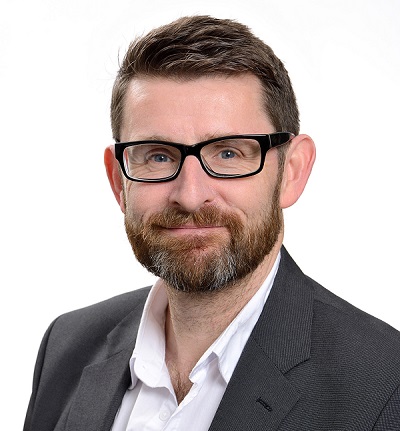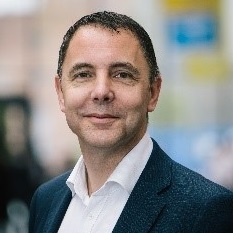Links to external sources may no longer work as intended. The content may not represent the latest thinking in this area or the Society’s current position on the topic.
Industry Fellows College networking event

A networking meeting organised by the Industry Fellows College. The program focuses on introducing new members of the college through presentations and networking time.
Located at the Sci-Tech Daresbury campus, delegates will gain the opportunity to experience the facilities and equipment at the Liverpool Virtual Engineering Centre, a leading digital technology innovation centre. The VEC has several advanced laboratories that research virtual engineering simulation, robotics and autonomous systems, virtual reality and haptic simulation.
Attending this event
As well as new and current Industry Fellows, there will be a limited number of places at this event for others interested in the relationship between industry and academia.
If you would like to attend, please email industry@royalsociety.org with a short explanation as to why you are interested in the event.
As places are limited, we cannot guarantee that there will be a space available.
Organisers
Schedule

Professor Joe Sweeney, University of Salford

Professor Joe Sweeney, University of SalfordProfessor Joe Sweeney was awarded a BSc in Chemistry and elected an Associate of the Royal College of Science at Imperial College, and carried out a PhD studying synthetic uses of aziridines and allylstannanes at the University of Oxford. In 1990, Joe was appointed as Lecturer in Chemistry at the University of Bristol where he developed research projects focused on new methods for preparation and use of polyhydroxylated ring structures, aziridines and metalled furanones, and the total synthesis of several naturally-occurring lactones. He then moved to a Readership in Organic Chemistry at the University of Reading. In 2007, Joe was awarded the inaugural Faculty Output Prize at the University of Reading for his group's publication on asymmetric rearrangements, and became Professor of Synthesis and Chemical Biology. In 2008, Joe was awarded a Royal Society Industry Fellowship with AstraZeneca, which was later extended. Joe is now Dean for the School of Science, Engineering and Environment at the University of Salford. |

Professor Susan Smith, Head of Daresbury Laboratory and Director of ASTeC

Professor Susan Smith, Head of Daresbury Laboratory and Director of ASTeCProfessor Susan Smith is Head of Daresbury Laboratory and Director of STFC’s Accelerator Science Technology Centre (ASTeC). A graduate of Glasgow University, Susan started as a physicist in 1985 at Daresbury Laboratory on the development of the SRS and then the design of the Oxford Compact Source. From ~ 1995 till 2007, she led the lattice design for the UK's Diamond Light Source and then progressed to the leadership of accelerator studies. She is currently Director of STFC’s Accelerator Science and Technology Centre.

Professor Massimo Noro

Professor Massimo NoroMassimo Noro recently joined STFC as the Business Development Director at Daresbury, following a successful industrial R&D career at Unilever - a large multinational and a market leader in home care, personal care, refreshments and foods products. His scientific interests and expertise are in the area of mesoscale modelling of colloidal and self-assembling systems. After his undergraduate education at University of Padova (Italy) in Chemistry (Laurea, Magna-cum-Laude) he completed a PhD in Physical Chemistry at the University of California, Los Angeles (USA) and then pursued post-doctoral work at FOM-AMOLF in Amsterdam (NL), sponsored through a Marie Curie EU Fellowship. |

Professor Peter Scott, University of Warwick

Professor Peter Scott, University of WarwickPeter Scott graduated in Applied Chemistry from Salford University and completed a DPhil in organometallic chemistry in Oxford in 1991. That year he was awarded a Royal Society European Research Fellowship to work on polymer catalysis in Konstanz, Germany. In 1992 took a Ramsay Memorial Fellowship to Sussex University, UK where he had his first academic appointment. Moving to Warwick in 1997 he was promoted to Professor in 2004 and awarded DSc in 2008. He conducts collaborative interdisciplinary research in two areas: the discovery of self-assembling molecules as antimicrobials and cancer medicines, and interfacially-active polyolefin materials for industry. Peter is founder and scientific director of the Warwick spin-out Interface Polymers Ltd, Director of Warwick’s Institute of Advanced Study (2017-) and a Royal Society Industry Fellow (2018-). 
Professor Derek Atkinson, University of Durham

Professor Derek Atkinson, University of DurhamI was appointed the inaugural Sir Gareth Roberts Professor of Applied Physicist at Durham University in April 2017. My research experience in academia and industry extends over two decades and involves work on magnetic materials, thin-film semiconductors for flexible electronics and nanocomposite pressure-sensitive inks for sensors. My work includes industrial collaborations involving functional materials. The primary focus is in magnetism, which involves understanding the relationships between physical structure, fundamental magnetic material properties and the magnetization reversal behaviour of nanoscale magnetic structures. This currently includes work on flexible spintronics and synthetic magnetic materials for microwave applications. I previously held a UK EPSRC Advanced Research Fellowship in Nanoscale Magnetism and Spintronics from 2004 to 2009, an RCUK Fellowship in Nanoscience from 2006 to 2011 and in 2008 I was a visiting research fellow at CSIC in Madrid, Spain. In 2000 I was awarded a BAE Systems Chair’s Gold Award for Innovation. 
Dr Charalampos Tsoumpas, University of Leeds

Dr Charalampos Tsoumpas, University of LeedsDr Charalampos (Harry) Tsoumpas is Lecturer in Medical Imaging at the University of Leeds since 2013 and Lead for Enterprise & Innovation at the Leeds Institute of Cardiovascular & Metabolic Medicine. He is also Honorary Research Officer at the Leeds Teaching Hospitals NHS Trust and Visiting Assistant Professor at the Translational Molecular Imaging Institute at Mount Sinai, New York. Dr Tsoumpas received his PhD degree from Imperial College London in 2008 and he worked for five years as research fellow at King's College London. He is also Senior Member of IEEE and Fellow of the Higher Education Academy since 2013. His main research interest is in the field of molecular imaging with focus on mathematics, multi-physics modelling and computing of Positron Emission Tomography with an aim to create innovative, disruptive and cutting-edge imaging approaches that will significantly evolve clinical research and healthcare. 
Dr Anas Al Rawi, British Telecommunications

Dr Anas Al Rawi, British TelecommunicationsAnas is currently a Senior Research Scientist at BT R&D. Since joining in 2012, he has been heavily involved in developing novel transmission techniques in attempt to push the information capacity of copper channels beyond current limits. He is responsible for modelling and simulating the current and future generations of broadband technologies. His research interests include computational electromagnetics, transmission cross-layer optimisation, cooperative networks, and MIMO system design. Anas graduated from Newcastle University in 2011. He was awarded Overseas Research Studentship (ORS) to pursuit a PhD degree in wireless network optimisation for the years 2007-2010. Following that, he worked on ray tracing, algorithms for position tracking and self-organised wireless sensor networks for monitoring extreme environments. Anas published many scientific papers, filed many patents and made several standard contributions. He is a regular reviewer for several IEEE journals and conferences and an active member of several national and European research projects. 
Dr Duncan MachLachlan, Rolls-Royce

Dr Duncan MachLachlan, Rolls-RoyceDuncan MacLachlan did an undergraduate degree in Materials and Mechanical Engineering in Trinity College Dublin, he followed this with a PhD and Post-Doctorate in the Department of Materials Science in Cambridge University. During this time Duncan identified and modelled several of the key deformation and failure mechanisms in high strength single crystal superalloys used for turbine blades in modern jet engines. Duncan has since spent 15 years in Rolls-Royce plc and has worked in several functions including Manufacturing, Materials, Structural Integrity and Mechanical Methods. His current role is as a specialist in structural integrity and fatigue lifing. During his time in Rolls-Royce Duncan has maintained close links with Universities and been responsible for funding many research projects. Duncan’s Royal Society Industry Fellowship is hosted by Imperial College where he also holds an Honorary Senior Research Fellowship. |

Professor Alison McMillan, Wrexham Glyndwr University

Professor Alison McMillan, Wrexham Glyndwr UniversityAlison McMillan held her Royal Society Industry Fellowship part-time from 2007 to 2011. At that time she was working for Rolls-Royce as a specialist on composite materials capability acquisition programmes. Initially, her Fellowship was with University of Bristol, but during that time, she found it actually provided a very useful basis of visiting a number of universities and this lead to collaborations with the Universities of Oxford, Cambridge, Ulster, Imperial College and TU Dresden. Since the Fellowship, Alison has transitioned her career into academia, and is currently Professor in Aerospace Technology at Wrexham Glyndwr University. More recently she has reduced to part-time, and set up an innovation consultancy company: WOT-I LTD, so that she can retain links in both academia and industry. 
Professor Robin Sloan, Semtech EMEA ltd.

Professor Robin Sloan, Semtech EMEA ltd.Prof Rob Sloan is currently a Principal Analogue IC Design Engineer at Semtech EMEA Ltd., Manchester designing MMICs for future optoelectronic communication systems. Prior to this he was an academic at University of Manchester where he worked for 23 years up until October 2017. He was previously the Head of the Materials, Devices and Systems Division in School E&EE at the University of Manchester. He is a Royal Society Industrial Fellow (May 2014) and was a Visiting Fellow (2009 – 2017) at Keysight Technologies, Santa Rosa, USA where he developed broadband, millimetre-wave components for future vector network analyser families. He is a Member of British Institute of NDT (BINDT) and a Member of the American Society for Non-Destructive Test (ASNT) and a founding member of the ASNT Microwave Methods Committee which is currently developing microwave inspection standards. |

Ben Peace, Head of Manufacturing, KTN

Ben Peace, Head of Manufacturing, KTNBen is Head of Manufacturing at the “Knowledge Transfer Network” – the UK’s Innovation Network. He worked in industry for ten years in product development – first in a university spinout, and then in a multi-national heating conglomerate. He then spent a couple of years in innovation consultancy before joining the Knowledge Transfer Network (KTN) in 2011. KTN’s mission is to stimulate innovation and join up the innovation landscape. With many thousands of members they do this by setting up effective collaborative partnerships and providing access to funding. In recent months Ben has been developing and delivering an SME outreach programme on 4th Industrial Revolution called “4Manufacturing”. |
Chair

Brian Holliday CEng FIET, Managing Director - Siemens Digital Industries

Brian Holliday CEng FIET, Managing Director - Siemens Digital Industries
Brian Holliday is a member of the Senior Leadership Team of Siemens plc and Managing Director for Siemens Digital Industries, which serves the manufacturing and infrastructure sectors. He is also Chairman of Siemens Industry Software UK.
He holds board memberships for the High Value Manufacturing Catapult and Make UK, the Manufacturers’ Organisation, and has contributed to Parliamentary Select Committees on the topics of Education and Industry 4.0. He is a member of the Royal Society’s Science, Industry and Translation Committee.
A Chartered Engineer and Fellow of the Institution of Engineering and Technology,
Brian started his career with Texas Instruments and went on to read Computer Systems at Cardiff University before joining Siemens, the global leader in electrification, automation and digitalisation in 1993.
He attained his Executive MBA at Manchester Business School in 2000 and in 2014 became a graduate of the CBI’s Executive Leadership Programme.
